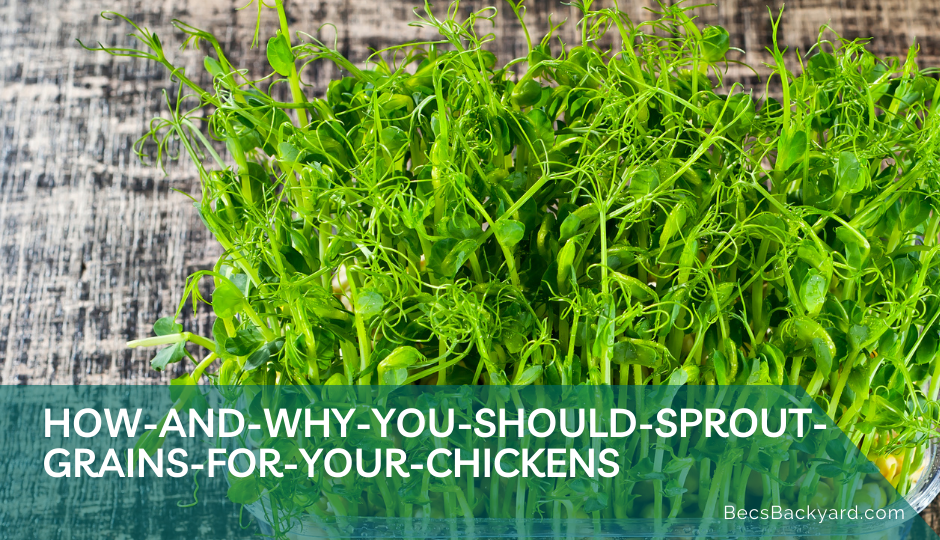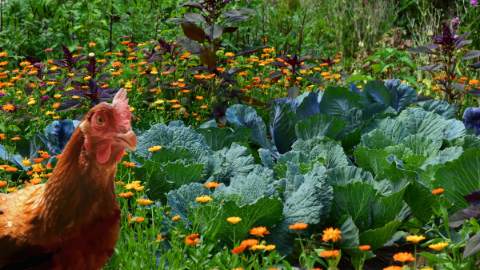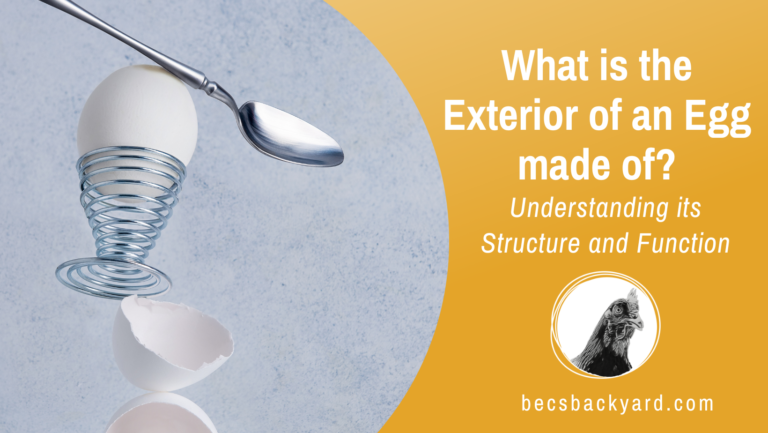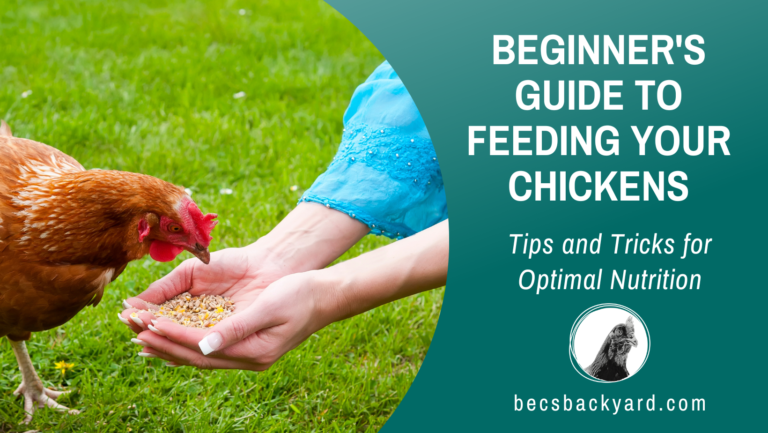How and Why : Sprouting Grains for Chickens

Sprouting grains for chickens is a popular practice among backyard chicken keepers. It involves soaking grains in water until they start to sprout, which increases their nutritional content and digestibility. The practice of sprouting grains is not new, as it has been used for human consumption for many years. It is now gaining popularity among chicken keepers due to its cost-effectiveness and health benefits for chickens. Learn how and why you should sprout grains for your chickens.
Sprouted grains are rich in enzymes, vitamins, and minerals that are essential for the growth and development of chickens. They contain more protein, fiber, and carbohydrates than unsprouted grains, making them a healthier option for chickens. Additionally, sprouted grains are easier for chickens to digest, which can reduce the risk of digestive problems such as impacted crops and sour crop. Sprouting grains can also save money on feed costs, as sprouted grains multiply in size and weight, providing more food for chickens.

Understanding the Importance of Sprouting Grains
Sprouting grains is an essential process for anyone who wants to provide their chickens with a healthy and balanced diet. This process involves soaking the grains in water for a specific period, allowing them to germinate and grow into sprouts. While it may seem like an extra step, sprouting grains for your chickens can be highly beneficial.
Nutritional Benefits
Sprouting grains increases their nutritional value, making them more nutritious for your chickens than unsprouted grains. During the sprouting process, the grains release enzymes that break down the complex carbohydrates and proteins into simpler forms that are easier for the chickens to digest. This makes the nutrients more bioavailable, allowing the chickens to absorb them more efficiently.
Sprouted grains contain more vitamins, minerals, and antioxidants than unsprouted grains. For example, sprouted wheat contains higher levels of Vitamin C, Vitamin E, and beta-carotene than unsprouted wheat. Additionally, sprouted grains are rich in enzymes that aid in digestion and improve gut health in chickens.
Economic Advantages
Sprouting grains can be an economic advantage for chicken owners. By sprouting grains, you can increase the amount of feed you have available for your chickens. This is because sprouting grains can increase the volume of the feed by up to 50%. Additionally, sprouted grains can be a cost-effective way to provide your chickens with a nutritious diet.
Sprouting grains can also help reduce the amount of waste generated by your chickens. This is because sprouted grains are more digestible, which means that your chickens will produce less waste and require less feed to maintain their weight.
In conclusion, sprouting grains for your chickens can be highly beneficial. It increases the nutritional value of the grains, making them more nutritious for your chickens, and can be an economic advantage for chicken owners. By understanding the importance of sprouting grains, you can provide your chickens with a healthy and balanced diet that will keep them happy and healthy.
The Science Behind Grain Sprouting
Sprouting grains is a process that involves soaking grains in water and allowing them to grow into sprouts. This process has been used for centuries to make grains more nutritious and easier to digest. Sprouting can be especially beneficial for chickens, as it can improve the quality of their feed and help them grow healthier and stronger.
The Sprouting Process
The sprouting process begins by soaking grains in water for several hours. During this time, the grains absorb water and begin to soften. After soaking, the grains are drained and rinsed several times a day for a few days. This allows the grains to grow into sprouts, which can be fed to chickens.
The length of time required for sprouting depends on the type of grain and the desired length of the sprout. For example, wheat can be sprouted in as little as 24 hours, while barley may take up to five days. It is important to monitor the sprouting process carefully to ensure that the grains do not become moldy or spoil.
Role of Enzymes
The sprouting process activates enzymes in the grains, which help to break down complex nutrients into simpler forms that are easier for chickens to digest. This can make the grains more nutritious and improve the absorption of essential vitamins and minerals. Sprouted grains are also higher in protein and lower in carbohydrates than unsprouted grains, which can be beneficial for chickens that require a high protein diet.
Enzymes also play a role in reducing the levels of antinutrients in grains. Antinutrients are compounds that can interfere with the absorption of nutrients in the body. Sprouting can help to reduce the levels of antinutrients such as phytic acid, which can improve the digestibility of grains.
In conclusion, sprouting grains can be a simple and effective way to improve the quality of feed for chickens. By activating enzymes and reducing antinutrients, sprouted grains can provide a more nutritious and easily digestible source of food for chickens.
Step-by-Step Guide to Sprouting Grains
Choosing the Right Grains
When selecting grains for sprouting, it is important to choose high-quality grains that are free from mold, fungus, and other contaminants. Organic, non-GMO grains are the best choice. Some of the most popular grains for sprouting include wheat, barley, oats, and rye.
Sprouting Process
- Rinse the grains: Rinse the grains thoroughly with cold water to remove any dirt or debris.
- Soak the grains: Place the grains in a container and add enough water to cover them completely. Let them soak for 12-24 hours.
- Drain the water: Drain the water from the container and rinse the grains again with cold water.
- Rinse and drain: Rinse and drain the grains every 8-12 hours for the next 2-4 days until the sprouts are about 1/4 to 1/2 inch long.
- Dry the sprouts: Once the sprouts have reached the desired length, rinse them thoroughly and spread them out on a clean towel to dry.
When to Feed Chickens
Sprouted grains are a great addition to a chicken’s diet. They are a good source of protein, vitamins, and minerals. However, it is important to feed them in moderation. Too much sprouted grain can cause digestive problems for chickens so it is a great idea to alternate with other plants for chickens.
It is recommended to feed chickens sprouted grains as a treat rather than a staple food. A good rule of thumb is to feed them no more than 10% of their daily diet. Sprouted grains can be fed to chickens either fresh or dried. If feeding them fresh, make sure to remove any excess water to prevent mold growth. If feeding them dried, store them in an airtight container in a cool, dry place.
By following this simple step-by-step guide, sprouting grains for chickens can be a great way to provide them with a healthy and nutritious treat.
Potential Challenges and Solutions
When sprouting grains for chickens, there are a few potential challenges that may arise. Here are some common issues and solutions to help ensure a successful sprouting process.
Mold Issues
One of the main concerns when sprouting grains is mold growth. Mold can occur when the grains are too wet or kept in a warm and humid environment. To prevent mold growth, it is important to rinse the grains thoroughly and drain off any excess water. Keeping the sprouts relatively cool (room temperature) and rinsing with cool, clean water will also help prevent mold.
If mold does occur, it is best to discard the sprouts and start over. It is not safe to feed moldy sprouts to chickens as it can cause health problems.
Over-Sprouting
Another challenge that can arise when sprouting grains is over-sprouting. Over-sprouting can occur when the grains are left to sprout for too long, resulting in long, stringy sprouts that may not be as palatable for chickens.
To prevent over-sprouting, it is important to monitor the sprouts closely and feed them when they reach 2-4 inches long. Simply place the sprouts in the chicken run to feed, and the chickens will eat the entire sprout, seed, and roots.
Overall, with proper care and attention, sprouting grains for chickens can be a great way to provide fresh, nutritious food for your flock. By being aware of potential challenges and taking steps to prevent them, you can ensure a successful and safe sprouting process.
Evaluating the Impact on Your Chickens
Health Improvements
Sprouted grains are a great source of nutrition for chickens. They contain more vitamins, minerals, and enzymes than unsprouted grains. Sprouting grains for chickens also increases the bioavailability of nutrients, making them easier for chickens to digest. This can lead to improved health and overall well-being for your flock.
Studies have shown that chickens fed sprouted grains have stronger immune systems, which can help prevent diseases and infections. Sprouted grains are also a good source of protein, which is essential for muscle growth and repair. Chickens that are fed sprouted grains may have stronger bones and be less prone to injuries.
Egg Production
In addition to improving the health of your chickens, sprouted grains can also increase egg production. The increased nutrition from sprouted grains can help chickens lay more and better quality eggs. The omega-3 fatty acids found in sprouted grains can also improve the nutritional content of eggs.
Sprouted grains can also help reduce stress in chickens, which can lead to increased egg production. Chickens that are less stressed are more likely to lay eggs consistently and at a higher rate. By feeding your chickens sprouted grains, you may be able to improve their overall health and increase their egg production.
Overall, sprouted grains can be a valuable addition to your chicken’s diet. They are easy to grow and can provide numerous benefits to your flock. By evaluating the impact of sprouted grains on your chickens, you can make an informed decision about whether or not to incorporate them into their diet.
Frequently Asked Questions : Sprouting Grains for Chickens
What are the benefits of sprouting grains for chickens?
Sprouting grains for chickens has several benefits. Sprouted grains are more easily digested than unsprouted grains, making them a more nutritious option for your chickens. Additionally, sprouted grains have a higher enzyme content, which helps your chickens absorb more nutrients from their food. Sprouted grains are also a great source of vitamins and minerals, which can help keep your chickens healthy.
Which grains are best for sprouting for chickens?
The best grains for sprouting for chickens are wheat, barley, rye, wheatgrass, wheat berries, and peas. These grains are all safe for chicken consumption and are more easily digested when sprouted.
How do you sprout grains for chickens?
To sprout grains for chickens, start by soaking the grains in water for 12-24 hours. After soaking, drain the water and rinse the grains twice a day, making sure to remove any standing water. Continue rinsing the grains for 3-5 days, until they have sprouted. Once the grains have sprouted, they can be fed to your chickens.
Where can you buy affordable sprouting seeds for chickens?
You can buy sprouting seeds for chickens at many feed stores and online retailers. Look for seeds that are certified organic or non-GMO project verified to ensure that they are safe for your chickens to consume.
Can you sprout sunflower seeds for chickens?
Yes, you can sprout sunflower seeds for chickens. Sunflower seeds are a great source of protein and other nutrients for your chickens. To sprout sunflower seeds, follow the same process as sprouting other grains.
Is it worth it to sprout grains for your chickens?
Yes, it is worth it to sprout grains for your chickens. Sprouted grains are more nutritious and easier to digest than unsprouted grains, which can help keep your chickens healthy. Additionally, sprouted grains can be a cost-effective way to feed your chickens, as they can produce more edible product than unsprouted grains.
Conclusion
Sprouting grains for chickens is an easy and cost-effective way to provide your feathered friends with a nutritious and delicious treat. By sprouting grains, you can unlock hidden nutrients and enzymes that are not available in unsprouted grains. Chickens love the taste of sprouts and will eagerly gobble them up, making them a great addition to their diet.
Sprouting grains is also a great way to save money on feed costs. By sprouting grains, you can increase the amount of feed you get from a bag of grain, as the sprouts weigh more than the unsprouted grain. Additionally, sprouts are more digestible than unsprouted grains, which means that your chickens will get more nutrition and fiber from the same amount of feed.
When sprouting grains for chickens, it is important to keep the sprouts clean and free from mold. Rinse the sprouts with cool, clean water and keep them relatively cool to prevent mold growth. Feed the sprouts to your chickens when they are 2-4 inches long, as this is when they are at their most nutritious.
In conclusion, sprouting grains for chickens is a great way to provide your birds with a nutritious and tasty treat while also saving money on feed costs. With a little bit of time and effort, you can easily sprout your own grains and give your chickens a healthy boost to their diet.






